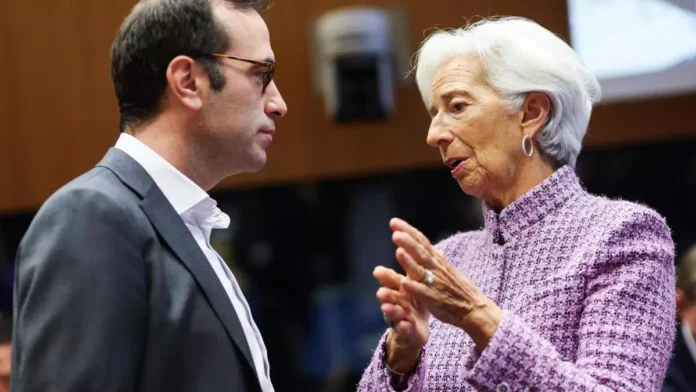The European Central Bank (ECB) has decided to cut interest rates by 0.25 points, bringing the main reference rate to 3.25% (the deposit facility rate, which automatically affects the Euribor). This move is part of the ECB’s ongoing efforts to ease financing conditions in response to moderating inflation and to stimulate the economy, especially due to the economic stagnation in Germany and weak growth in France.
“The disinflationary process is well underway,” stated the ECB’s Governing Council in its announcement on Thursday. Additionally, ECB President Christine Lagarde, in her usual press conference, pointed to “weaker-than-expected economic activity,” primarily in the industrial sector, as well as a decline in household spending and slower job creation. She also acknowledged “downside risks” posed by potential declines in business and consumer confidence, along with the impact of the Israel-Gaza conflict and attacks on Lebanon. However, Lagarde emphasized that economic growth is not the ECB’s primary concern, as its mandate is to maintain price stability.
This rate cut marks the third such reduction, each by 0.25 points, in this phase of monetary easing. The first cut occurred in June, signaling the end of an aggressive rate hike cycle that began in 2022 to combat inflation. The second followed last month, reducing rates to 3.5% after a technical adjustment.
On Thursday, the ECB met expectations set by investors and experts, who have projected further cuts over the coming months. These predictions now foresee quarterly rate cuts through autumn, with the aim of reaching 2% or 2.25%, with five consecutive cuts expected to bring rates to this level by spring. The next ECB Governing Council meeting is scheduled for December 12, when the institution will update its macroeconomic forecasts.
Inflation in the eurozone has already moderated to 1.7% year-over-year in September, and to 1.5% in Spain, falling below the ECB’s theoretical target of 2%. However, the economic weakness in key countries like Germany and France is becoming increasingly evident, especially in the industrial sector—though Spain remains a bright spot, leading GDP growth among major EU economies. In this context, cheaper financing is essential for both households seeking loans and businesses looking to invest.
Despite these cuts, financing conditions in the eurozone “remain restrictive,” which in monetary policy terms means they continue to suppress demand. The ECB’s Governing Council and President Lagarde continue to stress that their decisions are “data-dependent” and taken “meeting by meeting.”
No Mention of Economic Growth in the ECB’s Statement
“We expect inflation to rise in the coming months before gradually decreasing to our target over the next year. Domestic inflation remains high, driven by rising wages,” explained the ECB’s Thursday press release. Notably, the statement made no mention of economic growth, although Lagarde did address the issue during her press conference. The statement closed with a firm message: “The Governing Council is not committing to any specific path for interest rates.”
“There is a risk of reaching a tipping point, where some companies may stop creating jobs because the recovery is too slow, which could trigger a snowball effect,” said Martins Kazaks, the Governor of the Bank of Latvia and one of the more hawkish members of the ECB’s Governing Council, in a recent statement.
Kazaks’ stance is significant because the so-called “hawks” on the ECB council are more likely to prioritize inflation control over economic growth, even if tighter monetary policy risks triggering a recession. More moderate voices have been warning for months that monetary policy, much like steering a large ship, risks running aground if changes are made too close to the harbor.
In the worst-case scenario—if rate hikes go too far and inflation falls below 2% in the coming year or beyond—the main fear could shift to deflation. This is an even more dangerous economic threat than inflation, as it is usually associated with recessions and job destruction.
Thursday’s interest rate cut is “a step in the right direction,” admits Positive Money, a non-profit organization advocating for fairer monetary policy. “But with business activity slowing in the eurozone and economies like Germany in decline, more drastic action is needed,” the group added.
“Now that inflation is below the 2% target, the focus should shift to supporting our economies and accelerating much-needed investments, particularly in the green transition, which has been hampered by high interest rates,” Positive Money experts concluded.

